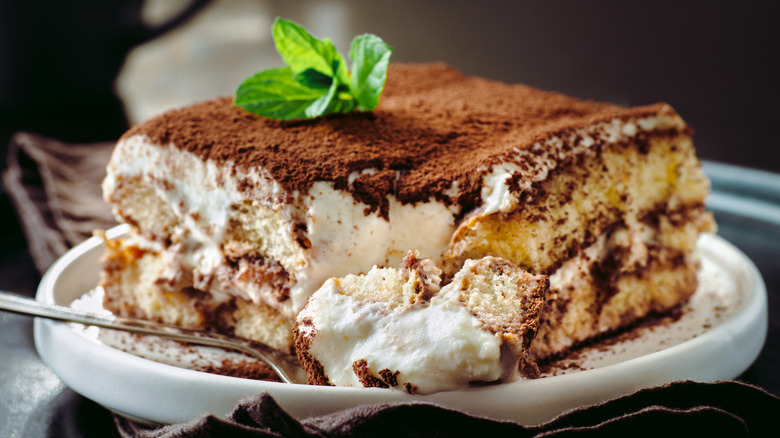Can Alcoholic Dessert Bakes Actually Make You Drunk?
Maybe you're at a party, and you see that someone's serving "upside-down pineapple and rum cake." You could be at a restaurant and notice that the dessert menu offers a "bourbon brownie covered in pecans and vanilla ice cream." In what some may see as a surprising move, Betty Crocker even tells us that you could add vodka to pastry dough to prevent the development of gluten and provide a flaky crust.
The idea of combining desserts and liquor isn't exactly an unconventional idea. Indeed, Wine Magazine tells us that it's not uncommon for specific kinds of chocolate to be paired with certain kinds of wine, such as dark somewhat bitter chocolate with rich red wine. The Pioneer Woman reports that bourbon is seen paired with brownies because bourbon not only has a "warm, vanilla-like flavor," but is used in the creation of some vanilla extracts. Besides, there are plenty of other examples of liquor being added to food, such as beer-can chicken or beef roast braised in stout beer. Adding a splash of whiskey or rum to a dessert seems like the only obvious course to follow.
But have you ever wondered just why you haven't gotten drunk off these desserts? After all, if there's bourbon in that caramel sauce or a noticeable taste of rum in that pineapple cake, you would have to feel a light buzz, right? Can you get drunk off dessert, or is there something that prevents inebriation when you eat boozy sweets?
It's technically possible to get drunk off boozy desserts
The idea of getting drunk off your dinner or your dessert may sound like something only the lightest of lightweights would have to worry about. But it's possible that it could happen — although this is based on a few select factors.
According to Insider, eating meals with alcohol in them can indeed raise your blood alcohol level the same way drinking a straight glass of liquor would. While it is true, Food Network tells us that alcohol can be burned off when cooked, the dish in question would have to be cooked for nearly three or more hours until the last drops of alcohol are burned up. Your piece of pineapple rum cake or bourbon brownie isn't the same as chugging a bottle of booze without stopping, sure, but you're still getting alcohol in you either way.
Of course, this doesn't mean you should be paranoid about eating foods infused with alcohol. Insider explains that there are factors to keep in mind, such as how much food you've already eaten and how different people process alcohol. If you're eating on a full stomach, you'll absorb alcohol much more slowly than someone on an empty stomach. If you are still concerned about having a dish with alcohol in it, you're free to skip it entirely.
But boozy desserts, even if they do raise your blood alcohol level, are still nothing to be concerned about, considering how much alcohol is in them to begin with.
Boozy desserts don't have too much liquor in them
Although foods with alcohol in them can theoretically get you drunk, there's nothing to be concerned about eating a dessert that has liquor in it. The amount of alcohol found in those types of desserts, while enough to raise your blood alcohol content, isn't enough to get you completely drunk after eating it. The use of alcohol is more or less used as a flavor enhancer and is used rather sparingly when preparing desserts. As Subha R. Dias, an Associate Professor of Chemistry at Carnegie Mellon University, explains to The Takeout, the usual amount of alcohol found in something like cakes or brownies is so low that one would barely feel any effect.
While adults can eat bourbon-infused brownies without any problem, it's still suggested to keep the brownies away from young children in particular. Dias explains that a very young child, such as an infant, wouldn't be able to handle large quantities of the dessert in question because of the infant's small body mass. Aside from this minor and obvious concern, one needn't worry about getting tipsy off a dessert made with liquor, and it is unlikely that older children would have any issues either.
From boozy cupcakes to tiramisu, eating a dessert that happens to have alcohol in it probably won't affect you. By the time the dessert has been portioned out, any alcoholic content is likely minimal. However, if you're worried, be sure to pace yourself and don't indulge on an empty stomach.


